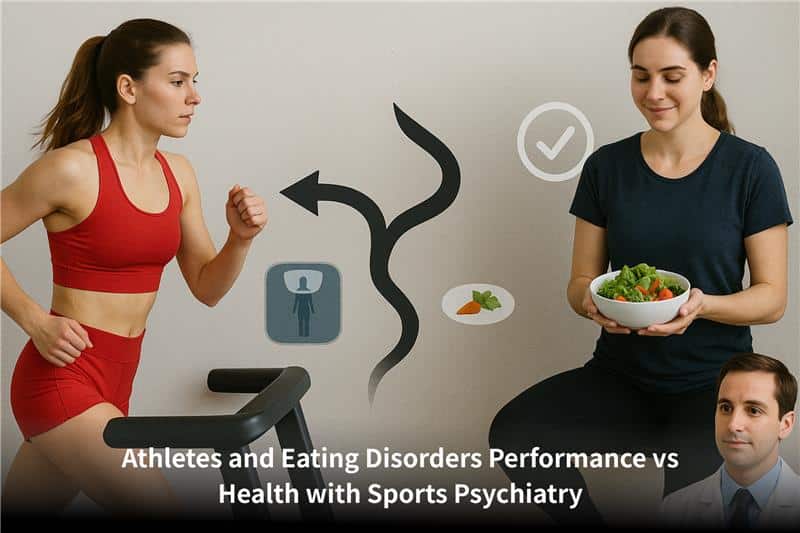Athletes are admired for their strength and discipline. Yet behind the scenes they are often fighting a different kind of battle against an eating disorder. Research suggests that between 35 and 45 percent of female athletes struggle with disordered eating and 19% of male athletes’ report disordered eating at some point in time.
When being the best means maintaining body size, body image, and athletic performance they can develop maladaptive eating behaviors. Therefore, working with a psychiatrist for eating disorders is important. Sports psychiatry treats athletes with eating disorders and protects both psychiatric and athletic performance.
Why Athletes Are at Higher Risk of Eating Disorders
Sport culture frequently connects success with weight and body shapes. Athletes in figure skating, cross country, and gymnastics deal with the high expectations regarding what a “healthy weight” is expected to be. These influences often lead to disordered eating habits.
An athlete’s journey can begin with rigid meal plans or weight management, and spiral into anorexia nervosa, bulimia nervosa, or binge eating disorder. In professions where the athlete is not an individual (i.e. a team or group), coaches or team members may inadvertently support the inclination that their performance is related to body image.
Signs of disordered eating (stress fractures, severe fatigue, mood changes, etc.) may be overlooked, until it becomes so bad that health is compromised. Athletes who ignore signs of disordered eating compromise their health and athletes’ performance.
Common Risk Factors and Warning Signs in Athletes
| Risk Factors | Warning Signs | Impact on Performance |
| Pressure to maintain a certain body size | Rapid weight loss or gain | Increased risk of injuries and stress fractures |
| Sports with weight or appearance focus | Obsession with food or calories | Reduced strength and endurance |
| High training loads with inadequate nutrition | Extreme fatigue or dizziness | Slower recovery and poor performance |
| Diet culture and body image comparisons | Mood swings, anxiety, or depression | Decline in mental focus and motivation |
The Role of an Eating Disorder Specialist in Sports Psychiatry
A general therapist may not fully understand the issues with professional athletes. This is why having an eating disorders specialist can make a difference. A psychiatrist that specializes in eating disorders brings the medical component, and will provide sport-specific psychiatric care.
Psychiatrists who specialize in eating disorders do not just treat food behaviors, but will address co-existing mental health conditions (i.e., anxiety disorders, bipolar disorder, or anxiety depression).
For some athletes, seeing a binge eating disorder psychiatrist is beneficial. The psychiatrist is able to help by providing a cycle of overeating and guilt, which makes it a personal and supportive ramp, by also minimizing risks to athletes who may develop losing their long term health and potentially career too soon.
Treating Eating Disorders in Athletes Finding the Balance
Eating Disorder Treatment for athletes must balance recovery with training. A one-size-fits-all approach does not work. Instead, treatment for eating issues in athletes combines therapy, nutritional guidance, and psychiatric care.
Athletes often need treatment plans tailored to their sport. For example, figure skaters may need support to build strength without focusing only on weight. Cross country runners may need help avoiding calorie restriction that affects endurance. Treatment must protect high performance without harming long term physical health.
Medication and Mental Health Support
In some cases, prescribed medications are part of recovery. Medication management helps athletes manage co-occurring conditions like anxiety, depression or bipolar disorder. This is critical since untreated mental health conditions can worsen eating disorders.
Psychiatrists provide full mental health care, offering both therapy and medical support. By combining psychological care with medication when needed, athletes receive balanced treatment.
Online Psychiatry Services for Athletes
Busy training schedules make in-person care difficult. Here, online psychiatry services and online mental health services help athletes stay consistent with treatment. With secured telehealth platforms, their athletes can meet with a psychiatrist from anywhere. This means that the athlete can find mental health care when traveling, at tournaments, or at training camps.
Mental Health Services in Lubbock TX
For the athletes living in Texas, mental health services Lubbock TX provides trustworthy local providers. A psychiatrist in Lubbock TX will know their community’s needs, while providing psychiatric care. Local services will help to coordinate care with sport psychologists, trainers, and family support.
Insurance can be confusing, but many insurance plans cover eating disorder treatment. If athletes are aware of their benefits, they could find affordable care without having to delay seeking care.
Mental Health Care for Athletes Long Term
Recovery from an eating disorder does not happen overnight. Long term mental health care is vital to prevent relapsing and maintain physical health and performance. Athletes need to learn how to develop a sustainable eating pattern rather than just focusing on weight goals in the short term.
Eating disorder specialists, like sport-focused registered dieticians, can help athletes focus on muscle mass, strength, and wellness rather than diet culture lies and misconceptions. Coaches and teammates can also play a part, and by being aware of risk factors and acting on them before they develop into a crisis, teams reduce the risk factors and offer athletes a healthier way to approach a sports performance.
Choosing Health Without Sacrificing Performance
Athletes deserve both peak performance and long-term health. Sports psychiatry makes this balance possible. With the right eating disorder treatment, athletes protect their careers, their physical health, and their future.
If you are an athlete or know an athlete who is struggling, please do not hesitate to reach out for help. A psychiatrist for eating disorders can help create an individualized path towards recovery. With either an online psychiatry service or local mental health services Lubbock TX there is care available.
MindVibe believes every athlete deserves compassionate care. Our team specializes in helping athletes recover from eating disorders while also supporting their sporting goals.
Want to know more about MindVibe? Visit https://mindvibe.com/
FAQs
Does a healthier diet improve sports performance
Yes, when an athlete has balanced nutrition, it improves energy, recovery, and focus in training and competition.
As an athlete, how does sport affect an individual’s mental health?
Sport can improve confidence and self-esteem, but it can also have significant stresses, pressures, and performance outcomes that can have an impact on mental health.
How can a person’s diet impact their performance in sports?
A person’s diet will directly affect their endurance and muscle strength and their recovery. If their diet was poor, it might affect fatigue, injury, or recovery.
Is there a relationship between nutrition and mental performance?
Yes. Balanced nutrition provides the necessary fuel for the brain, maintains mood stability, and improves focus and performance during competition.
What types of mental struggles can a person have related to sport?
Athletes can experience anxiety disorders, depression/fear/trauma, stress related to body image issues and standards, and issues relating to disordered eating behaviors.











